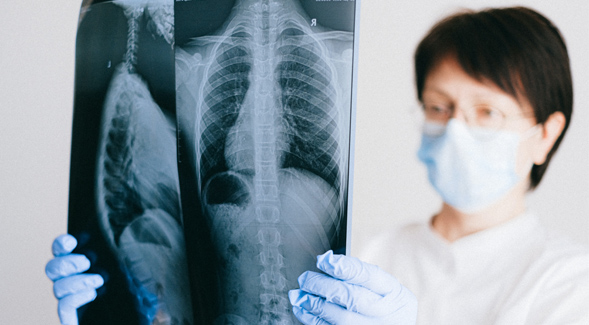COVID-19 Could Activate Latent Tuberculosis
Up to 13 million people may have latent TB in the U.S, which could be activated by COVID-19. It worries an SDSU researcher and TB expert.

For most of us in the United States, our only awareness of tuberculosis (TB) may be the skin patch test required to work or volunteer in schools or health care facilities. But that could change during the pandemic.
TB is considered a disease of the developing world and is caused by a bacterium — Mycobacterium tuberculosis — that usually attacks the lungs, but can attack any part of the body. Not everyone infected becomes sick, so two stages of infection exist: a latent phase when people are asymptomatic, and an active phase when they develop symptoms and become ill.
But TB has a worrisome connection to the novel coronavirus. For someone with latent TB, contracting COVID-19 could activate the bacterium, potentially leading to an accelerated and more severe form of the disease which could lead to hospitalization and rapid death. Both diseases are airborne and spread when people cough or sneeze.
Latent TB is present in populations everywhere, including the U.S. While there is a high incidence of active TB in India, China, Indonesia, the Philippines, Pakistan, Bangladesh, Nigeria and South Africa, what is less well-known is that nearly 9,000 TB cases were reported in the U.S in 2019 and up to 13 million people are estimated to have the latent form of the disease in the U.S. alone, per the U.S. Centers for Disease Control and Prevention (CDC).
It’s these numbers that worry genomics expert and TB researcher Faramarz Valafar, a professor at San Diego State University’s School of Public Health.
Drug Resistant Strains
Worldwide, TB is among the top 10 causes of death. It killed 1.5 million people in 2018, and about 10 million people fall ill with it each year, according to the World Health Organization (WHO). While it’s mostly curable and preventable, some strains of the bacteria have proven to be drug resistant.
Valafar’s lab studies multi-drug resistant TB and is funded by the National Institute for Allergy and Infectious Diseases. He has collaborations with researchers in hospitals and public health agencies in several countries including South Africa, where clinical trials are underway and planned, to test different hypotheses including those that describe the interplay between TB, AIDS, and COVID-19.
“When people get sick with SARS-CoV-2, they could not only activate their latent TB, but also transmit their TB along with SARS-CoV-2 to others,” Valafar said. “The U.S has been spared from the wrath of drug resistant TB so far, but may no longer be that lucky. We need to prepare. We may start seeing strains that are atypical in the United States very soon.”
People who have traveled abroad and acquired drug resistant TB in its latent form in the past may now experience activation of their latent TB because of COVID-19, he noted. He fears this could cause outbreaks of drug resistant TB in the U.S.
Valafar explained that the TB bacterium is an opportunistic pathogen and remains latent, waiting for people’s immune system to become compromised — as in the case of AIDS, or overwhelmed — as in the case of COVID-19, before it activates.
“We have already seen the synergy between TB and AIDS, so it’s a distinct possibility,” he said. “While having TB could make people more susceptible to COVID-19, the coronavirus can also help spread TB much faster, acting as a vehicle of transmission.”
He is not the only one who thinks these synergies need investigation.
BCG Vaccine Debate
While there is still so much that is unknown about COVID-19 and our understanding of the novel coronavirus and its impact keeps evolving, theories abound about whether the BCG (Bacillus Calmette–Guérin) vaccine provides some level of protection. BCG is primarily used to guard against TB and has varying effectiveness. Countries with a high TB burden routinely vaccinate their populations, but in the U.S, it is not recommended by the CDC except on a case-by-case basis.
Valafar and his South African collaborators are planning a multi-cohort study to investigate the synergy between TB, COVID-19 and AIDS, and their rates of transmission. The study will also investigate the effects of the BCG vaccine on COVID initiated transmission of TB, as well as the rate of COVID-19 transmission among vaccinated populations.
Valafar has also been advocating that patients with COVID-19 be given the antibiotics typically administered to patients with TB disease, to prevent the activation of latent TB.
There is also concern among TB advocates that millions more cases will go untested and undiagnosed due to the lockdown, setting back progress made in recent years to gain the upper hand on the disease.
TB may have been largely relegated to developing nations, Valafar said, “but unless the richer countries that control most of the planet’s resources take it seriously and control it globally, a pandemic like COVID-19 can bring it to the developed countries, including the United States.”



